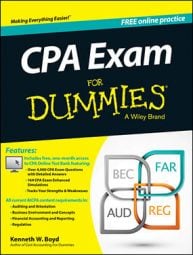The Uniform CPA Examination is developed and graded by the American Institute of CPAs, or AICPA, which is the world’s largest member association for the accounting profession. The AICPA exists to set accounting standards and to support and expand the accounting profession. You can find lots of great information at their website.
The purpose of the CPA exam is to fulfill one of several requirements for a license to practice public accounting. Passing the exam qualifies you to be certified by a state. Although the exam is the same in every state, you obtain a license to practice from a State Board of Accountancy.
What you need for a license to practice public accounting
A certified public accountant is someone who has earned a license in his or her state. Check out This Way to CPA to find out the requirements for your state. Each state has requirements that address three specific areas: education, experience, and ethics.
Education requirements
Most states require a bachelor’s degree to meet the education requirement. However, a growing number of states require 150 semester hours of college credit.
Many states are adding to the education requirement because they feel that a bachelor’s degree doesn’t cover all the skills sets needed for the CPA profession. The accounting industry adds rules and regulations each year. These added requirements mean that the CPA candidate needs a larger body of knowledge. As technology becomes more complex, the CPA must learn more to use technology effectively.
Experience requirement
Most states require at least two years of experience in the accounting profession. The type of experience required also varies by state. In some cases, the work must be with a public accounting firm. Many firms will hire accountants who are not yet CPAs. These accountants work lower level accounting positions until they pass the CPA exam. At that point, they may be promoted into positions with more responsibility.
Some companies will help an employee pay for the CPA exam and a review course. Ask potential employers whether they offer this type of benefit.
Ethics
State Boards view ethics as very important because CPAs have a great deal of responsibility. CPAs fill most of the senior accounting positions at companies. One primary responsibility is to generate financial statements. If an unethical CPA produces financial statements that are intentionally incorrect, the impact can be enormous.
Because the CPA’s potential impact on stakeholders is so great, nearly all State Boards of Accountancy require an ethics exam, known as Rules of Professional Conduct. Many also require continuing education for CPAs in the field of ethics.
CPA exam topics
To pass the CPA exam, you must pass each of these four exams:
Auditing and attestation (AUD): This test covers the process of planning and implementing an audit. The test requires you to know a great deal of the language that’s used to write audit opinions. Reviews, compilations, and other engagements are on the AUD test.
Financial accounting and reporting (FAR): The FAR test covers the nuts and bolts of working as an accountant. You need to know how to account for a variety of accounting transactions, including accrual entries. This test also covers financial-statement presentation.
Business environment and concepts (BEC): This test addresses subjects that are closer to those covered in a broad business school curriculum. The BEC test covers many decision-making tools. BEC also covers some economic topics.
Regulation (REG): REG covers many issues you may see in a business law class, including agency and sales law concepts. A large portion of the REG test addresses taxation of businesses, trusts, and estates as well as individual taxation.

